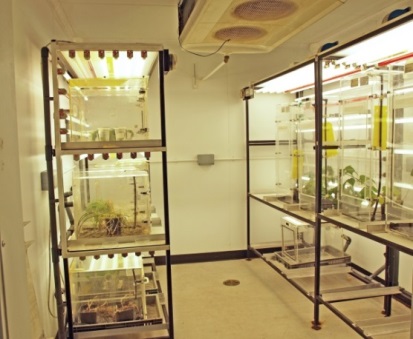Culturing collected insect material allows the preservation of live reference collections and provides insect material for research.

Our insect cultures are held in dedicated insect-rearing rooms which provide appropriate environment control. In addition, we use controlled environment cabinets to maintain insect cultures in duplicate and to provide flexibility to vary environmental conditions at different stages of insect life cycles.
We have the following aphid species in the collection
 Myzus persicae
Myzus persicae- Macrosiphum euphorbiae
- Sitobion avenae
- Rhopalosiphum padi
- Amphorophora idaei
The unique aphid culture collection represents some of the genetic diversity, including insecticide-susceptible and -resistance, found in Scotland for each of the species and we are continually updating our collection to ensure we hold the most up to date genotypes.
The aphids in our collection are important agricultural pests with many of them being vectors of economically-important plant viruses. Our aphid research is particularly focussed on studying the molecular characterisation of aphids, aphid-plant interactions, virus transmission by aphids, and control of aphids by natural enemies with the focus ultimately aiming to contribute to the development of alternative control strategies for these pests.
We also maintain a culture of the spotted wing drosophila (Drosophila suzukii) collected from Scottish sites. This is used in our research to understand the biology and behaviour of this pest with the aim to develop an IPM system that can successfully manage the population size.
Our insect collections support a number of research projects funded by the Scottish Government, commercial partners, levy boards and academic funding sources. We are happy to respond to requests to provide material that we hold in the collections and are willing to set up cultures of new species (subject to guidance from SASA when required).
For further information contact: Gaynor Malloch or Carolyn Mitchell
